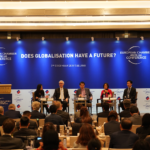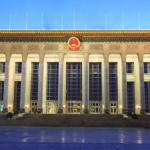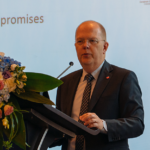Address by European Chamber President Joerg Wuttke at the Annual Conference 2016 Go back »
2016-12-15 | Beijing
Dear Excellency’s, lieber Dietmar
Dear members and friends,
The past year has not been kind to international trade. As of the second quarter of 2016, world merchandise trade had contracted by four per cent year-on-year in value terms. Protectionist actions globally have continued to mount.
Sometimes, we should not take things for granted, like globalisation.
I grew up in a remote village in Southwest Germany. My father had been at war in France and Russia in the 40s. Now, I carry the same passport and currency as my French friends, and I am married to a Russian. How times have changed.
I grew up as a passionate European, like former Chancellor Helmut Kohl, who lived just a few kilometres away in the city of Ludwigshafen, where my company’s head office is located. I grew up in a country that was giving up parts of its sovereignty to Europe, sovereignty that it had struggled so hard to gain in the years after we were liberated from Hitler’s dictatorship.
The EU is the world’s largest Free Trade Zone, and the benefits spilled over into daily life in my village.
Now, the EU seems to be at a crossroads. Brexit has signalled the departure of the most committed free trader: the UK. And the EU is currently struggling with another form of globalisation: migration. Over the last year, my country received a million refugees, welcoming and housing the tired and poor huddled masses who were yearning to breathe freely. Let us not forget that this huge number is not unprecedented, though: during the last decade of the 19th century and early 20th century, New York’s Ellis Island received one million refugees per year, primarily from Europe.
My father worked in Heidelberg at the NATO HQ, where, growing up, I got to know the US troops. To me and my village, Pax Americana was our safeguard. At university I studied the benefits of the Anglo Saxon trade and economic architecture, which helped the world to resurface from the ashes of the Second World War: The World Bank, the IMF and the WTO, among other multilateral organisations. My British brother in law was heading the Financial Times on the continent, the pink paper being the mouth piece of globalisation. To me as a young man, globalisation was a natural occurrence with the promise of a better future.
Now the US, too, finds itself at a crossroads. We have to see what The Apprentice Donald Trump will do to the established architecture of globalisation. He preaches isolationism, and we all know how that ended when the US went down that road in the 1920s.
I came to China for the first time in 1982, shortly after the tiny man—the big genius—Deng Xiaoping began leading China out of its self-imposed dark ages, her disastrous isolationism. Globalisation worked wonders on this grand nation. I still marvel how my personal hero, former Premier Zhu Rongji, led China into the WTO in 2001, facing stiff resistance from all quarters. China’s share of global exports mushroomed from four per cent in 2001, to 14 per cent now. China has been the biggest beneficiary of globalisation this century.
I was one of the 51 founding fathers and mothers of the EU Chamber in 2000. It was established in the spirit of those years – the belief that China possessed the ability to reform, China had the strength to open up, and China had the commitment to change. We were inspired by Premier Zhu’s actions and vision. He endured hardship for the better future of China. This led to ten years of strong, double-digit growth, helped along by the tailwinds of globalisation. But it also caused complacency among China’s elite. Our member companies were also content, though still constrained as our position papers continue to indicate on an annual basis.
Sometimes we should not take things for granted. We had to recognise: Zhu’s one-term reform regime was not carried on. It remained a second-term pledge that never happened.
The EU business community was stirred and inspired when we read the visionary DRC World Bank vision China 2030, which led to the reform pledges of the Third Plenum in late 2013. It appealed to us right away, as the core of that vison was ‘market forces’. But now we see that while China may have got a new soccer coach, he still has to struggle with the same old players.
The reform implementations were timid, as reported by our members in late 2015. In particular, local authorities were weary of pushing for reforms out of fear of stepping on some big toes. Interest groups had lots to lose and pushed back in a very skilled manner.
We live in the ‘new normal’ in China, we were told. And this was reiterated very eloquently in the People’s Daily on 9th May, in the interview with the ‘Authoritative Person’. It is significant that the message delivered is that China will not experience a U- or V-shaped economic recovery, and that L- shaped progress would be beneficial for the economy, but policies did not follow this up – were all the reform pledges just symbolism, lacking in substance?
We are now experiencing a new world: it is not Europe that pours money into China, the FDI figures indicate a diminished investment appetite. We are, however, experiencing a steep rise of Chinese investment into the EU, which is beneficial for China as well as our home region. The ease with which Chinese companies can operate in the EU, conduct M&As and establish companies shows not only the openness of the EU, but also the benefits of globalisation, as well as the allure of our rule of law.
How will China fit into our EU economic ecosystem? This economic giant struggles at home with the rule of law, as indicated by the Fourth Plenum, and despite the constant pledges of ‘opening up’, hardly anything changes in the regulatory environment to the benefit of foreign companies. China, as reflected in the OECD ranking of countries according to the stringency of their environment for foreign investment, placed second-to-last among the 59 countries evaluated in 2015. Will China be a contributor to the economic benefit of the EU, or a rent seeker?
China still operates a legal system that distinguishes between domestic investors and equity of foreign origin. The foreign investment laws, the Negative List, the Foreign Investment Catalogue – the EU has none of these things: EU laws disregard the origin of the money.
Chinese companies can acquire EU banks, car companies, airports, shipping ports and high tech companies at will – something that EU business can only dream about in this market. We do navigate the complexities of the Chinese economic landscape well, though; the one-way streets and the stop signs. EU business is really good at this, as our surveys indicate. But the stark contrast between the economic regulatory systems in the EU and China are becoming more obvious every day. The word ‘reciprocity’ has become popular these days, and rightfully so – ODI will outstrip FDI even more in the years to come.
We should not take things for granted. The times are changing. China should not make the mistake of relying on past EU openness. Three major demonstrations by thousands of EU workers on the streets of Brussels this year—protesting against steel dumping into the EU—provided a highly visible shift in the awareness of China among Europeans. The EU Parliamentarian discussion of Market Economy Status gave a firm indication of just how dissatisfied our voters’ representatives are with the lack of progress in China. While China’s intriguing OBOR vision is perhaps a great opportunity for businesses at both ends, as it connects the largest economy in the world with China, it is important that ‘One Belt, One Road’ is not a one-way street. Reciprocity is an important concept to consider while developing this grand scheme.
Made in China 2025 is an interesting roadmap for China to become an innovative superpower. But this roadmap is filled with flawed concepts like ‘indigenous innovation’ and the setting of targets for global market share for Chinese industries by 2025. In the EU we are not familiar with a government funding and steering a ‘global market share’ concept. We are used to market forces. The German concept of 4.0 is one such example – a small fund of only 200 million euros has kick-started an idea that is now being brought to life by companies, academia and individuals.
The EU business community hopes that Chinese government agencies will find the courage to finally follow through on the concept of the Third Plenum, dusting off the pledges from three years ago and implementing those overdue reforms. Market forces are vital to create an innovative Chinese ecosystem, not heavy-handed government intervention, the visible hand that might cost more money than it creates value.
We should not take things for granted. China has to choose its path towards progress and global integration. The EU Chamber still believes in the DNA of our organisation: that China has the ability to reform, China has the strength to open up, and China has the commitment to change.
Thank you


